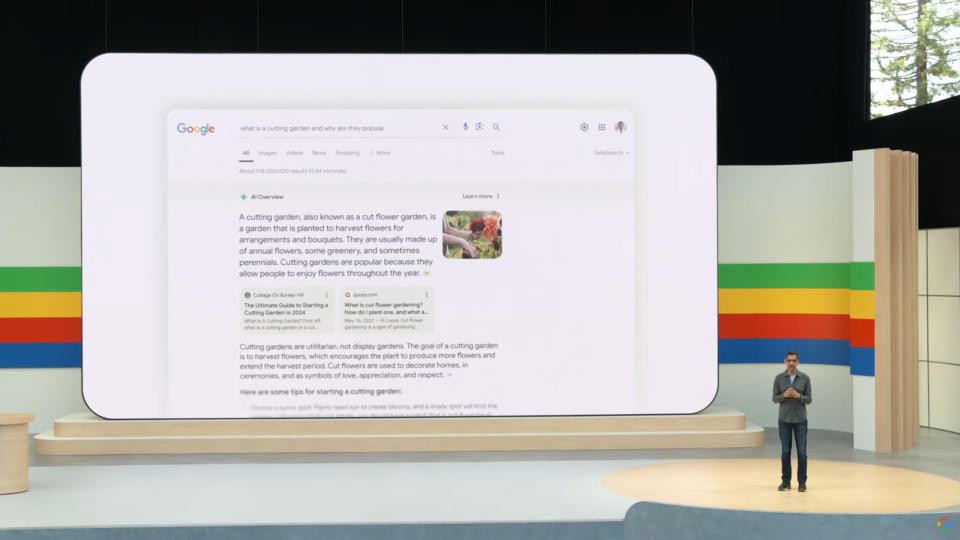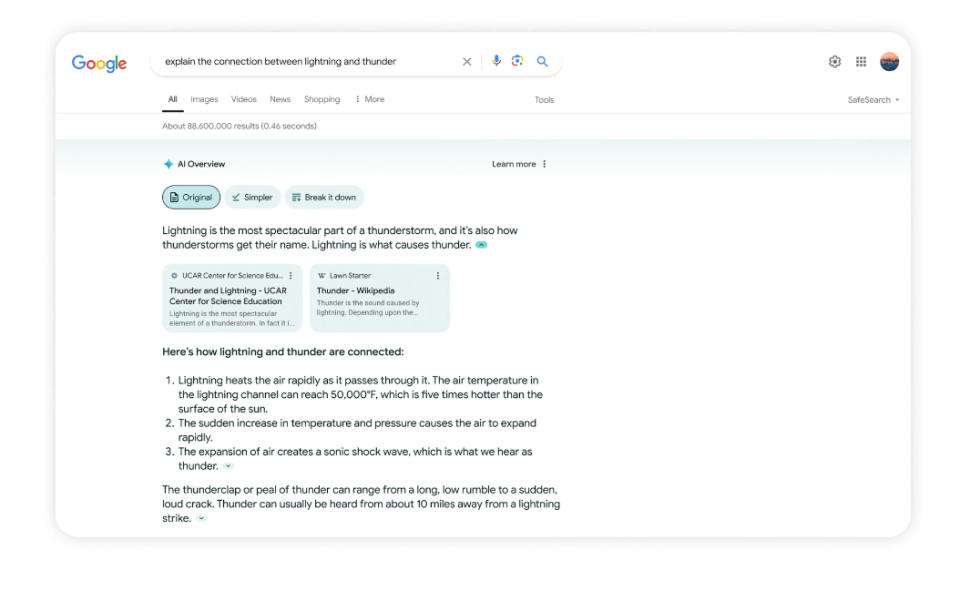Jacob Ridley, senior hardware editor

This week I have been: a visit to my home country of Wales in the metaverse. Oh, with all this AI stuff you forgot about the metaverse, huh?
How did we get into this mess? A handful of companies claim to oversee a service to which billions of people around the world contribute. We’ve become so dependent on Google to point us in the right direction that the company can now exert a sense of ownership over the content it should signpost. A handful of Google executives shouldn’t have the power to change the Internet, but they do. They are. And there’s seemingly little we can do to stop them.
Google unveiled many new features coming to Google Search this week at Google I/O, the most notable of which are AI overviews. These are designed to answer users’ questions faster: you type or speak a query into Google search, Google finds an answer and generates an answer. There on the page.
“Google does the Googling for you,” says Liz Reid, head of search at Google.
Google’s AI model, Gemini, is key. It relies on using the world’s most extensive and comprehensive library of information to provide these answers to its users: Us.
Google not only acts as a gatekeeper to the Internet by giving us directions on where to get information, but it also serves up a host of advertisements. The money from this goes into the pockets of publishers, who in turn end up paying for more content. A rosy view of the charged and varied publishing industry, I admit, but in general this is how it works. Sprinkle some cash flow from affiliate marketing and you have the income report of many non-ecommerce websites.
What happens if the publisher receives fewer page views for their content? The stakes get higher, the money to invest gets lower, the advertising gets worse, and the content gets more desperate to attract visitors. The ‘enshitification’ of the Internet is ultimately a monetary issue.
And Google gets a say in all of this. It is at the center of the Internet, whether you use its services often or not. That’s become a problem in several ways over the years, as the company seeks new ways to provide information and make money through its index of the Internet, Search.


First advertisements. It then displays information directly from websites, directly on the search page. It is this behavior that got Google into trouble with several countries and even the EU. The European bloc’s legislation, passed by member states, had hoped to limit Google’s content grabbing without fair compensation to publishers for their work. Google responded by removing its services altogether from some countries or threatening to do so. Google News was only put back online in Spain in 2022.
With the advent of Google’s AI-powered search, we may be about to find out what happens when Google reduces a publisher’s ability to bring in appropriate revenue. And the results probably won’t be pretty.
Google says of the change: “As we expand this experience, we will continue to focus on driving valuable traffic to publishers and creators.” That one sentence, in a sea of AI news, with no further clarification on how it wants to do that, apart from a handful of links to further information in the result. Reid suggested ahead of I/O that it expects there will be growth in traffic rejected by users looking to dig deeper into topics that AI has provided answers to, but whether that happens remains to be seen .
Google suggests that it will only roll out AI overviews where it sees the most benefit from using them. Although nothing explicitly prevents a gradual expansion to the more traditional search engine.
Going by Google’s previous form and refusals to refund publishers, it’s easy to see why many are concerned. The New York Times published an article titled “Can Google Provide AI Answers Without Breaking the Web?” The NYT is currently embroiled in a lawsuit against OpenAI over the use of its articles to train chatbots.
Similarly, Google’s CEO has been questioned about whether the company is interested in OpenAI using YouTube videos to train its competing models. I would be surprised if Google wants to fight that battle, given its own positioning in AI.
The problem ultimately stems from a larger issue regarding AI: who gets to freely collect data for use in training and operating artificial intelligence systems? Copyright owners for videos, images and text have all sounded the alarm about the massive data collection for training AI systems. Although we are now talking about collecting, processing and reusing information in real time. In British law, there is no protection against copyright infringement for lifting stories (copying facts published by others), provided they are not copied in the same way, outside of quotations. That means there’s no obvious workaround for Google’s latest features.
A publisher can use tags to disable many of Google’s rich results features. This would apparently be the case disqualify the content for use by AI Overviews. However, AI Overviews takes up a portion of the search results page, pushing down all the naturally occurring content, which has already been gradually relegated to lesser places over the years. However, Google could adjust the size to make it more user-friendly, and may have already done so during previous development. This feature is not entirely new.


Although Google needs to be challenged for what it is doing. Not least because it seemingly goes against Google’s own recommendations for creating good content. As the company with the keys to the internet, publishers have long listened to Google’s advice on how to be seen on their platform. It recommends creators follow four guiding principles: EEAT.
E for experience, E for expertise, A for authority, T for reliability.
How long can these be achieved with fewer readers, fewer views, less money, and an AI that leans over and copies everyone’s answers for Google’s own gain? It might work for a while, but then the money trickles away and the content is inevitably worse off. At what point does reducing original content lead to a terrible user experience where Google’s search AI spits out incorrect answers? Some would argue that it is already quite poor and this is happening today.
Not to mention the risk of misinformation coming in from a third party (Google) and tweaking the words to undermine the reliability of the individual publisher.
Why should Google benefit from the hard work of others for a system that is increasingly pitted against actual content creators? I’d like to know.
Everyone with a stake in the internet deserves their own change. A movement away from mega-corporations that claim to run things and back to communities of people willing to share their thoughts and space with others. The Internet was not created by Google, nor is it redeemed by Google. More than ever before, it feels like Google is just getting in our way.